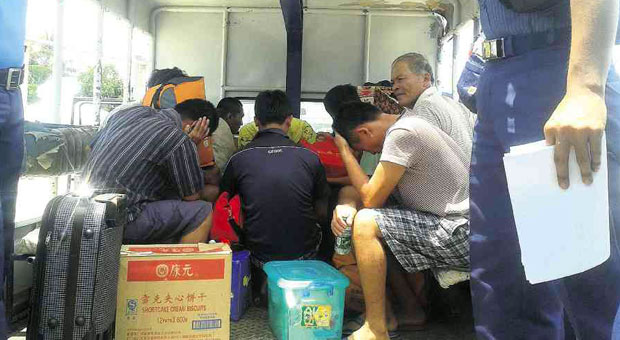Faster boats boost arrests of poachers, but more needed

CHINESE POACHERS Eleven Chinese fishermen arrested by Philippine maritime police for poaching in the West Philippine Sea arrive at the headquarters of the PNP Maritime Special Boat Unit in Honda Bay in Puerto Princesa City. REDEMPTO D. ANDA/INQUIRER SOUTHERN LUZON
MANILA, Philippines—With a cruising speed of 24 knots, the Monitoring, Control and Surveillance (MCS) boats jointly operated by the Philippine Coast Guard and the Bureau of Fisheries and Aquatic Resources, a Department of Agriculture-attached agency, can outrun the boats used by foreign and local illegal fishermen and poachers.
However, only 10 MCS patrol vessels are currently in service.
A top PCG official noted that these 10 MCS boats are tasked to cover the entire archipelago, including the West Philippine Sea (South China Sea), some islets and rock formations, as well as the surrounding waters of which are being claimed by China and other countries in the region.
The official, who asked not to be named for not having been authorized to speak to media, pointed out that not a single MCS vessel has been deployed to the West Philippine Sea since mid-2012 when PCG ships faced off with Chinese vessels at Panatag Shoal (Scarborough Shoal).
The same source cited a report posted on the Coast Guard website, saying that during the past couple of years, “hundreds of illegal fishermen have been arrested and their vessels seized” in joint PCG-BFAR operations.
Article continues after this advertisement“Modern MCS vessels” were used in these operations, the report said.
Article continues after this advertisementThe same vessels “can surge up to 24 knots, which are just the right speed needed in pursuit of high-powered boats used by illegal fishermen and poachers,” who reportedly use dynamites, cyanide, fine mesh nets, and trawls, among others, in their illegal operations.
According to the report, illegal fishing and poaching in the country are “aggravated by the fact that even foreign vessels risk arrest to be able to plunder Philippine territorial waters.”
“Under Philippine laws, the use of the country’s fishery and aquatic resources is reserved exclusively to Filipinos,” it said, adding “PCG-BFAR operating units continue to engage offenders of the nation’s fishery laws regardless of their nationalities.”
The Coast Guard is set to redeploy two MCS vessels to the northern Philippine waters after a 12-month break after the fatal shooting of a Taiwanese fisherman by PCG personnel on May 9, 2013 off Balintang Island in waters claimed by both Manila and Taipei.
Commander Genito Basilio, acting PCG spokesperson, told the Philippine Daily Inquirer the two patrol boats were have been scheduled “to leave shortly (for the Batanes group of islands).”
Of the 19 crew manning each MCS vessel, 17 were Coast Guard personnel while the other two were BFAR staff, Basilio said.
The two MCS patrol boats will be assigned to northern Philippine waters “up to July when the waters there would still be peaceful and calm,” according to Basilio.
“From August to the later part of the year, the currents in that area are expected to be turbulent,” he added.
RELATED STORIES
Philippines nabs 11 Chinese poachers
Philippines discovers pangolins on Chinese poacher boat
For comprehensive coverage, in-depth analysis, visit our special page for West Philippine Sea updates. Stay informed with articles, videos, and expert opinions.